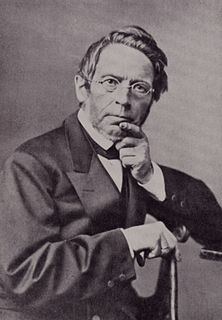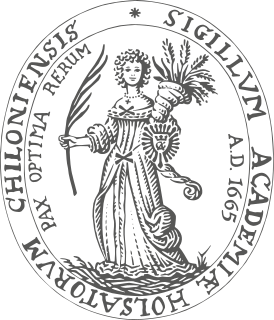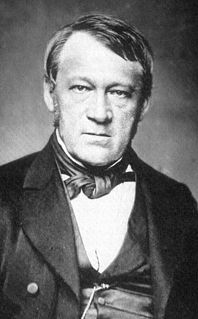
Niels Nikolaus Falck (25 November 1784 – 11 May 1850) was a Danish jurist and historian. [1] [2]

Niels Nikolaus Falck (25 November 1784 – 11 May 1850) was a Danish jurist and historian. [1] [2]
He was born at Emmerlef in the Duchy of Schleswig. He was educated at the University of Kiel and became a theological candidate in 1808, graduating dr. phil. in 1809. From 1813 he was appointed professor juris in Kiel. In 1814, he became professor of law at the University of Kiel, and in 1838 he was appointed president of the Schleswig-Holstein Assembly of the States.
He published a Juristische Encyklopädie (“Encyclopedia of jurisprudence,” 5th ed. 1851), and was a prolific author in the history and jurisprudence of Schleswig-Holstein. His other works include: Handbuch des schleswig-holsteinischen Privatrechts (“Handbook of civil law in Schleswig-Holstein,” 1825-48); and Sammlungen zur nähern Kunde des Vaterlandes (“Anthology for a better understanding of the fatherland,” 1819-25). He also edited the Staatsbürgerliches Magazin (10 vols., 1821–31; continued as Neues Staatsbürgerliches Magazin, 10 vols., 1833–41).
Falck became Commander of the Order of the Dannebrog in 1840. He died at Kiel in 1850 and was buried at Parkfriedhof Eichhof in Kronshagen.

Schleswig-Holstein is the northernmost of the 16 states of Germany, comprising most of the historical duchy of Holstein and the southern part of the former Duchy of Schleswig. Its capital city is Kiel; other notable cities are Lübeck and Flensburg.

Schleswig is a town in the northeastern part of Schleswig-Holstein, Germany. It is the capital of the Kreis (district) Schleswig-Flensburg. It has a population of about 27,000, the main industries being leather and food processing. It takes its name from the Schlei, an inlet of the Baltic sea at the end of which it sits, and vik or vig which means "bay" in Old Norse and Danish. Schleswig or Slesvig therefore means "bay of the Schlei".

Kiel is the capital and most populous city in the northern German state of Schleswig-Holstein, with a population of 249,023 (2016).

Flensburg is an independent town in the north of the German state of Schleswig-Holstein. Flensburg is the centre of the region of Southern Schleswig. After Kiel and Lübeck, it is the third largest town in Schleswig-Holstein.

Johann Gustav Bernhard Droysen was a German historian. His history of Alexander the Great was the first work representing a new school of German historical thought that idealized power held by so-called "great" men.

Prince Frederick Christian Charles Augustus of Schleswig-Holstein was a minor Danish-born German prince who became a member of the British royal family through his marriage to Princess Helena of the United Kingdom, the fifth child and third daughter of Queen Victoria and Prince Albert of Saxe-Coburg-Gotha.

Kiel University, officially the Christian-Albrecht University of Kiel, is a university in the city of Kiel, Germany. It was founded in 1665 as the Academia Holsatorum Chiloniensis by Christian Albert, Duke of Holstein-Gottorp and has approximately 27,000 students today. Kiel University is the largest, oldest, and most prestigious in the state of Schleswig-Holstein. Until 1864/66 it was not only the northernmost university in Germany but at the same time the 2nd largest university of Denmark. Faculty, alumni, and researchers of the Kiel University have won 12 Nobel Prizes. Kiel University has been a member of the German Universities Excellence Initiative since 2006. The Cluster of Excellence The Future Ocean, which was established in cooperation with the GEOMAR Helmholtz Centre for Ocean Research Kiel in 2006, is internationally recognized. The second Cluster of Excellence "Inflammation at Interfaces" deals with chronic inflammatory diseases. The Kiel Institute for the World Economy is also affiliated with Kiel University. The university has a great reputation for its focus on public international law. The oldest public international law institution in Germany and Europe - the Walther Schuecking Institute for International Law - is based in Kiel.

The Schleswig–Holstein question was a complex set of diplomatic and other issues arising in the 19th century from the relations of two duchies, Schleswig and Holstein, to the Danish crown, to the German Confederation, and to each other. The British statesman Lord Palmerston is reported to have said: "Only three people have ever really understood the Schleswig-Holstein business – the Prince Consort, who is dead – a German professor, who has gone mad – and I, who have forgotten all about it."

Georg Waitz was a German medieval historian and politician. Waitz is often spoken of as the leading disciple of Leopold von Ranke, though perhaps he had more affinity with Georg Heinrich Pertz or Friedrich Christoph Dahlmann. He concentrated on medieval German history.
Bernhard Ernst von Bülow was a Danish and German statesman.

The Duchy of Holstein was the northernmost state of the Holy Roman Empire, located in the present German state of Schleswig-Holstein. It originated when King Christian I of Denmark had his County of Holstein-Rendsburg elevated to a duchy by Emperor Frederick III in 1474. Members of the Danish House of Oldenburg ruled Holstein – jointly with the Duchy of Schleswig – for its entire existence.
Carl Otto von Madai was a German law professor, politician, and statesman.

Friedrich Ferdinand, Duke of Schleswig-Holstein-Sonderburg-Glücksburg, then Friedrich Ferdinand, Duke of Schleswig-Holstein, was the fourth Duke of Schleswig-Holstein-Sonderburg-Glücksburg and became the fifth Duke of Schleswig-Holstein in 1931.

Haderslev is a Danish town in the Region of Southern Denmark with a population of 22,032. It is the main town and the administrative seat of Haderslev Municipality and is situated in the eastern part of Southern Jutland. Haderslev is home of Sønderjyske, which is an association football team that plays in the Danish Superliga since 2008. The town is named after King Hader.

Peter II was the reigning Grand Duke of Oldenburg from 1853 to 1900. He claimed hereditary parts of Duchy of Holstein after the Second Schleswig War in 1864. After signing a treaty on 23 February 1867 in Kiel, he renounced his claims. In return, he received the district of Ahrensbök, the Prussian parts of the former Principality of Lübeck other than the village of Travenhorst, and was given a million taler as compensation from Prussia. Thus the Grand Duchy of Oldenburg gained access to the Baltic Sea.

Albert Hänel was a German jurist, legal historian and liberal politician. He was one of the leaders of the German Progress Party, and served as Rector of the University of Kiel. He served as a member of the Prussian Chamber of Deputies, the Reichstag of the North German Confederation and the Imperial Reichstag, and was Vice President of both the Prussian Chamber of Deputies and the Imperial Reichstag.

Niels Kaas was a Danish politician who served as Chancellor of Denmark from 1573 until his death. He was influential in the negotiation of the Peace of Stettin and in the upbringing of Christian IV. Kaas also played an important role in the emancipation of Schleswig-Holstein.
Anton Friedrich Ludwig Pelt was a German Protestant theologian.
This is a survey of the postage stamps and postal history of Holstein, Schleswig-Holstein, Schleswig and incidentally Lauenberg. Separate stamps were issued for Holstein (1850), Schleswig (1864-1867), Holstein (1864-1866), Schleswig-Holstein (1865) and Schleswig (1920).
Peter Friedrich Arpe was a German lawyer, historian and legal writer. He was also the founder of a huge collection of objects and manuscripts on the history of Schleswig-Holstein, though his collection also included banned theological works. He also wrote and collected under the Latinised form of his name, Petrus Fridericus Arpius.